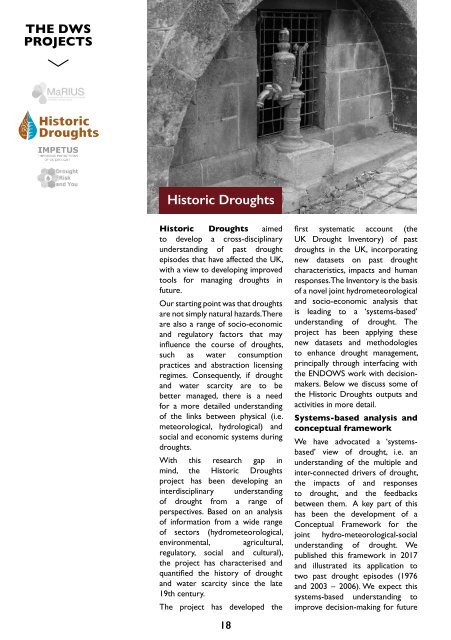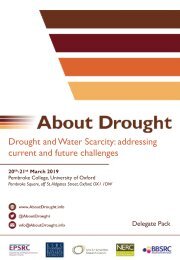About Drought Handbook: Outputs & Impacts
As the UK’s £12m Drought and Water Scarcity (DWS) research programme reaches its conclusion with a final event at The Royal Society in London, this handbook draws together the key outputs and outcomes. The book also features a series of interviews with our leading stakeholders, which highlight how successfully we have met our objectives to produce cutting-edge science that has made a demonstrable impact on how decision-makers manage water scarcity in the UK.
As the UK’s £12m Drought and Water Scarcity (DWS) research programme reaches its conclusion with a final event at The Royal Society in London, this handbook draws together the key outputs and outcomes. The book also features a series of interviews with our leading stakeholders, which highlight how successfully we have met our objectives to produce cutting-edge science that has made a demonstrable impact on how decision-makers manage water scarcity in the UK.
- No tags were found...
Create successful ePaper yourself
Turn your PDF publications into a flip-book with our unique Google optimized e-Paper software.
THE DWS<br />
PROJECTS<br />
Historic <strong>Drought</strong>s<br />
Historic <strong>Drought</strong>s aimed<br />
to develop a cross-disciplinary<br />
understanding of past drought<br />
episodes that have affected the UK,<br />
with a view to developing improved<br />
tools for managing droughts in<br />
future.<br />
Our starting point was that droughts<br />
are not simply natural hazards. There<br />
are also a range of socio-economic<br />
and regulatory factors that may<br />
influence the course of droughts,<br />
such as water consumption<br />
practices and abstraction licensing<br />
regimes. Consequently, if drought<br />
and water scarcity are to be<br />
better managed, there is a need<br />
for a more detailed understanding<br />
of the links between physical (i.e.<br />
meteorological, hydrological) and<br />
social and economic systems during<br />
droughts.<br />
With this research gap in<br />
mind, the Historic <strong>Drought</strong>s<br />
project has been developing an<br />
interdisciplinary understanding<br />
of drought from a range of<br />
perspectives. Based on an analysis<br />
of information from a wide range<br />
of sectors (hydrometeorological,<br />
environmental, agricultural,<br />
regulatory, social and cultural),<br />
the project has characterised and<br />
quantified the history of drought<br />
and water scarcity since the late<br />
19th century.<br />
The project has developed the<br />
18<br />
first systematic account (the<br />
UK <strong>Drought</strong> Inventory) of past<br />
droughts in the UK, incorporating<br />
new datasets on past drought<br />
characteristics, impacts and human<br />
responses. The Inventory is the basis<br />
of a novel joint hydrometeorological<br />
and socio-economic analysis that<br />
is leading to a ‘systems-based’<br />
understanding of drought. The<br />
project has been applying these<br />
new datasets and methodologies<br />
to enhance drought management,<br />
principally through interfacing with<br />
the ENDOWS work with decisionmakers.<br />
Below we discuss some of<br />
the Historic <strong>Drought</strong>s outputs and<br />
activities in more detail.<br />
Systems-based analysis and<br />
conceptual framework<br />
We have advocated a ‘systemsbased’<br />
view of drought, i.e. an<br />
understanding of the multiple and<br />
inter-connected drivers of drought,<br />
the impacts of and responses<br />
to drought, and the feedbacks<br />
between them. A key part of this<br />
has been the development of a<br />
Conceptual Framework for the<br />
joint hydro-meteorological-social<br />
understanding of drought. We<br />
published this framework in 2017<br />
and illustrated its application to<br />
two past drought episodes (1976<br />
and 2003 – 2006). We expect this<br />
systems-based understanding to<br />
improve decision-making for future




